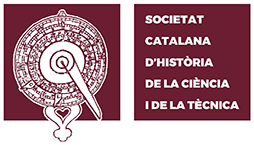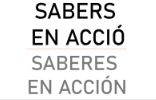Col·loquis de la SCHCT (2021-2022)
Cicle: “Societat Catalana d’Història de la Ciència i de la Tècnica: 30 Anys d’Educació, Investigació i Professió”
“Gender, domesticity and little slow science. The case of Agnes Pockels and the beginnings of surface science”
Brigitte van Tiggelen
(Mémosciences / Science History Institute)
Dijous 28 d’abril de 2022, 18.30h. (CEST)
Sessió online (link)
Per motius de salut de la conferenciant, Brigitte van Tiggelen, hem de cancel·lar el Col·loqui previst dins del Cicle SCHCT 30 Anys per a aquest dijous 28 d’abril. Disculpeu les molèsties.
Working in her kitchen, Agnes Pockels (1862 – 1935), a self-educated young woman living in Braunschweig (now Germany), published ground-breaking results in the nascent field of surface science in the early 1890’s. She established an experimental method to investigate the properties of thin films at the surface of water. In fact, with material found at home, she devised and assembled an instrument that would later become a standard laboratory tool and bear a man’s name: Langmuir trough (also referred to as Langmuir-Blodgett trough).
This research is part of a bigger project focused on the life and work of Agnes Pockels, taking her as a case-study to provide a better understanding of the articulation of gender, domesticity and science. Her investigations were indeed conducted at her home, and she even declined an offer to use laboratory facilities at the University of Göttingen, arguing her housewife duties didn’t allow her to move out of her household where she was required to take care of her ailing parents. Her modest publication record (15 articles and one translation in 35 years) focuses almost exclusively on surface phenomena. Only much later in life, at a time she was no longer contributing to the field, was she presented as a “founding mother” of the new discipline, when, in 1931, the Kolloid-Gesellschaft (the German colloid society) granted her a prize in recognition for establishing the standard methods in observing and experimenting with surface layers and surface films.
Her life and work are most often mentioned in the history of women in science with a narrative that underlines the domestic duties to which her gender confined her, and the belated acknowledgments from the scientific community as an inventor whose creativity laid the ground for others to pursue research in a new field. My perspective however ambitions to go beyond the individual trajectory or evaluating her exact role in the emergence of surface sciences. However remarkable the individual trajectory indeed, these narratives do not integrate a context in which the practice of sciences is occurring in domestic settings, nor does it measure the changing status of an emerging field. It will also be an opportunity to discuss regimes of scientific research such as thrifty science, slow science and little science.
Brigitte van Tiggelen is Director of European Operations at the Science History Institute, she has led Euchems’ Working Party on History of Chemistry and is organizer of the 10th ESHS Conference (Brussels, 2022). Her research fields include the periodic table, chemistry as a discipline, science popularization, and women and couples in sciences. She has recently co-edited the book Women in their Element: Selected Women’s Contributions to the Periodic System (World Scientific, 2019).
Presentació a càrrec d’Ignacio Suay (IILP-UV).
Xerrada inscrita dins del cicle especial: Societat d’Història de la Ciència i de la Tècnica, “30 anys d’Educació, Investigació i Professió”. La Societat Catalana d’Història de la Ciència i de la Tècnica (SCHCT) fou creada el 1991 com a representació col·lectiva professional i disciplinar de la història de la ciència, la tècnica i la medicina. Des de la seva fundació, a través de les seves accions ha permès impulsar el paper cívic del passat i present de la ciència, la tècnica i la medicina, el relleu generacional i la professionalització en l’àmbit geogràfic de llengua catalana i a nivell internacional.
Coordinat per Josep Simon & Alfons Zarzoso.


